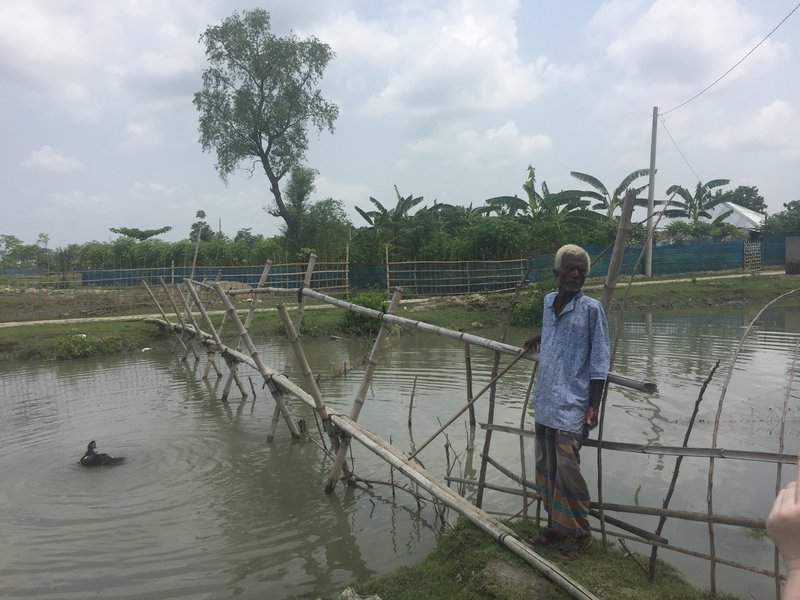Bangladesh’s most vulnerable plunged further into poverty by frequent climate disasters
The Leprosy Mission will support vulnerable people rebuild their lives after flash flooding has devastated the Sylhet district of Bangladesh.
The worst floods to hit the North of Bangladesh in more than a century are the latest in a string of climate exacerbated disasters. At least 68 people have died and millions are having to rebuild their lives after flash flooding submerged 72 per cent of Sylhet division, as well as other northern communities.
Among those left in the most desperate situations are people living below the poverty line and communities affected by Neglected Tropical Diseases, which includes leprosy.
Two hundred people affected by leprosy in the Sylhet division that The Leprosy Mission is supporting through self-help groups have been impacted by this week’s devastating floods.
James Pender is Environmental Advisor for The Leprosy Mission and previously lived in Bangladesh, working for the Church of Bangladesh. His job included the setting up of disaster management committees.
He said: “In terms of the impact of climate change, very few places in the world will experience the severity of changes that will occur in Bangladesh. This includes rising temperatures, flash flooding, more powerful cyclones and rising sea levels displacing communities.
“The impact is intensified by Bangladesh being one of the most populated and one of the poorest nations on earth.
“Our project leaders across Bangladesh are working in communities where climate change is contributing to death and widespread destruction. As a result, people are plunged deeper into poverty and food insecurity.
“It is a cruel truth that communities affected by Neglected Tropical Diseases, which include leprosy, are among the worst affected by climate exacerbated extreme weather events. It is also a cruel irony that while they have made a minimal contribution to climate change they are impacted the most.”
Increasing problems caused by climate change
James returned last month from the outskirts of the Sundarbans region in Southern Bangladesh where he visited a community that can no longer grow rice, vegetables and fruit trees as a result of saline intrusion.
He explained: “In the south they used to farm freshwater fish in ponds but they have now become too salty. A rise in sea level, increasing cyclones and reduced winter riverwater flows, as a result of climate change, has resulted in salt water intrusion and farmers are having to diversify.
“There’s a concern that the number of leprosy cases will rise due to people migrating to the big cities like Dhaka as they no longer can work the land.
“They move to overcrowded and poor conditions in the city slums. As a result, they are more susceptible to diseases like leprosy as their immune systems become weakened."
James said that it was through leprosy outreach camps in Dhaka that revealed people migrating to the city from the south, because of coastal erosion, were being treated for leprosy. This led to Leprosy Mission teams undertaking new outreach work in the south to find and cure people of leprosy. Dozens of new cases have been found and treated as a result.

James said: "It was in Satkhira in the south of Bangladesh where I met Bisawit (pictured above), a man who was cured of leprosy last year.
“Bisawit told me that he bought his land 25 years ago. But following Cyclone Aila in 2009, the land became too salty and his crops failed and lemon tree died.
“He’s had to diversify to shrimp and crab farming instead in order to feed himself. It is either a case of diversifying or to migrate to distant districts to work for on others’ farms as a day labourer.
“Because of the late treatment of leprosy, he is no longer able to walk properly and needs to use a stick to get around.
“He was visited by his nearest disaster management committee which includes in preparations; plans on how to evacuate people with disabilities to cyclone shelters in an emergency.
“It is not easy though as Bisawit’s nearest cyclone shelter Is 5km away. So the plan is for him to be picked up by a rickshaw to take him to the shelter. But beforehand he must cross a river. He is unable to do this easily, as there is only a very narrow bamboo bridge which he can't use because of his disability. So his only option is to swim across the river with help from a family member in rising waters and stormy weather which is an immense challenge.
"Responding to climate change impacts is much harder for Bisawit and many other people affected by leprosy compared to their neighbours. As leprosy related disability, stigma and marginalisation may add another layer onto the already almost insurmountable challenges they face from a changing climate and disaster events."